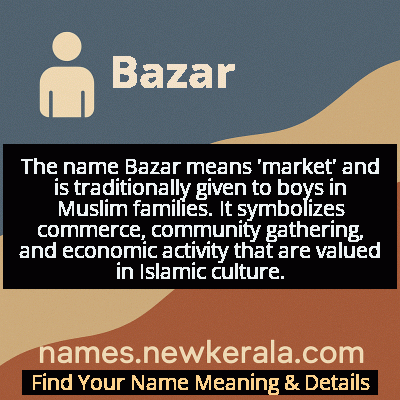Bazar Name Meaning & Details
Origin, Popularity, Numerology Analysis & Name Meaning of Bazar
Discover the origin, meaning, and cultural significance of the name BAZAR. Delve into its historical roots and explore the lasting impact it has had on communities and traditions.
Name
Bazar
Gender
Male
Origin
Muslim
Lucky Number
3
Meaning of the Name - Bazar
The name Bazar means 'market' and is traditionally given to boys in Muslim families. It symbolizes commerce, community gathering, and economic activity that are valued in Islamic culture.
Bazar - Complete Numerology Analysis
Your Numerology Number
Based on Pythagorean Numerology System
Ruling Planet
Jupiter
Positive Nature
Optimistic, inspirational, and creative.
Negative Traits
Scattered, exaggerating.
Lucky Colours
Yellow, gold, purple.
Lucky Days
Thursday.
Lucky Stones
Yellow sapphire.
Harmony Numbers
1, 2, 9.
Best Suited Professions
Arts, writing, communication.
What People Like About You
Creativity, optimism.
Famous People Named Bazar
Bazar Abdul Salam
Islamic Scholar
Renowned Quranic interpreter and educator in Central Asia
Bazar Khan
Military Leader
Tribal leader and military commander in the Afghan-Pakistan border regions
Bazar Ahmed
Businessman
Successful entrepreneur in Middle Eastern trade and commerce
Bazar Muhammad
Community Leader
Influential figure in establishing local markets and trade networks
Name Variations & International Equivalents
Click on blue names to explore their detailed meanings. Gray names with will be available soon.
Cultural & Historical Significance
In many Muslim cultures, the bazaar has been a center of learning, political discourse, and social organization. Master craftsmen, traders, and merchants operating in these spaces were often community leaders who helped maintain social order and cultural traditions. The name Bazar therefore conveys not just commercial acumen but also social responsibility and cultural stewardship. It represents the Islamic values of fair trade, honest dealing, and community welfare that are emphasized in Quranic teachings and Hadith. This cultural context makes the name particularly meaningful in families with mercantile traditions or those who value community leadership and economic self-sufficiency.
Extended Personality Analysis
Men named Bazar typically exhibit personality traits that reflect the dynamic nature of marketplaces - they are often energetic, adaptable, and skilled in social interactions. Their natural inclination toward commerce and negotiation makes them excellent problem-solvers who can navigate complex social and business situations with ease. They tend to be pragmatic and results-oriented, with a keen understanding of value and opportunity. Like a well-organized bazaar, they often have the ability to bring order to chaos and create systems that benefit multiple parties. Their social intelligence allows them to read people and situations accurately, making them effective mediators and networkers.
Beyond their commercial instincts, individuals with this name often demonstrate strong community values and a sense of responsibility toward others. They typically possess leadership qualities that emerge naturally in group settings, and they excel at building consensus and facilitating cooperation. While they may appear focused on practical matters, they often have deep emotional intelligence and genuine concern for community welfare. Their personality combines the entrepreneur's drive with the community leader's sense of duty, creating individuals who are both successful in their endeavors and respected for their contributions to society. This balance between self-interest and communal benefit is a hallmark of those who carry this meaningful name.
Modern Usage & Popularity
In contemporary naming practices, Bazar maintains a steady though not widespread usage, primarily within Muslim communities that value its cultural and economic symbolism. The name is most commonly found in Central Asia, the Middle East, and parts of South Asia, where traditional market culture remains vibrant. While it hasn't experienced the dramatic popularity surges of some modern names, it has shown resilience and occasional revival, particularly among families with mercantile backgrounds or those seeking names that reflect Islamic economic values. In recent years, there's been a subtle increase in usage among urban professionals who appreciate its connection to entrepreneurship and community building. The name's appeal lies in its balance of traditional roots and contemporary relevance, making it a meaningful choice for parents who want to honor heritage while embracing modern economic values.
Symbolic & Spiritual Meanings
The name Bazar carries rich symbolic meanings that extend far beyond its literal translation as 'market.' It represents the fundamental human need for exchange and connection - not just of goods, but of ideas, culture, and relationships. Symbolically, it embodies the concept of community as an interconnected ecosystem where diverse elements come together to create something greater than the sum of their parts. The name suggests abundance and prosperity in the broadest sense, including material wealth, social capital, and cultural richness. It symbolizes the continuous flow of energy and resources that characterizes healthy, vibrant communities. In Islamic symbolism, it represents the ideal of fair exchange and mutual benefit that underpins ethical commerce, reflecting the Quranic emphasis on honest trade and social justice. The name ultimately symbolizes the marketplace as a microcosm of society itself - a place where human potential is realized through interaction, cooperation, and the dignified pursuit of livelihood.

